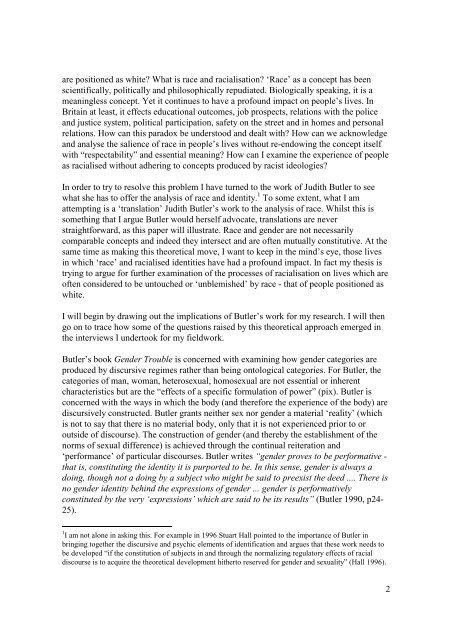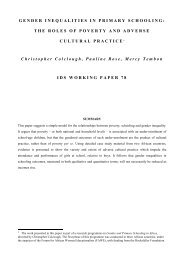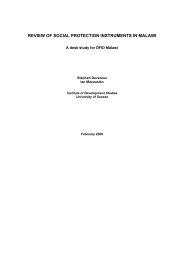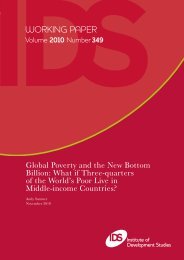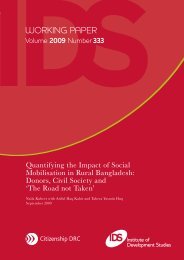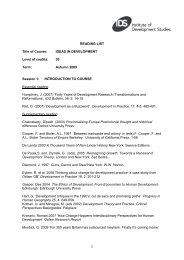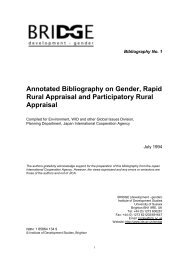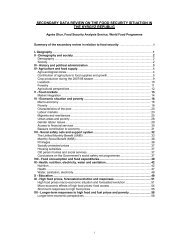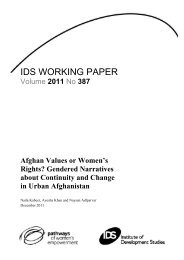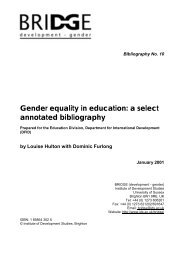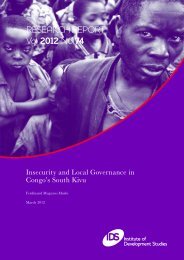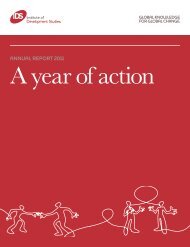1 'Troubling race. Using Judith Butler's work to think about racialised ...
1 'Troubling race. Using Judith Butler's work to think about racialised ...
1 'Troubling race. Using Judith Butler's work to think about racialised ...
Create successful ePaper yourself
Turn your PDF publications into a flip-book with our unique Google optimized e-Paper software.
are positioned as white? What is <strong>race</strong> and racialisation? ‘Race’ as a concept has been<br />
scientifically, politically and philosophically repudiated. Biologically speaking, it is a<br />
meaningless concept. Yet it continues <strong>to</strong> have a profound impact on people’s lives. In<br />
Britain at least, it effects educational outcomes, job prospects, relations with the police<br />
and justice system, political participation, safety on the street and in homes and personal<br />
relations. How can this paradox be unders<strong>to</strong>od and dealt with? How can we acknowledge<br />
and analyse the salience of <strong>race</strong> in people’s lives without re-endowing the concept itself<br />
with “respectability” and essential meaning? How can I examine the experience of people<br />
as <strong>racialised</strong> without adhering <strong>to</strong> concepts produced by racist ideologies?<br />
In order <strong>to</strong> try <strong>to</strong> resolve this problem I have turned <strong>to</strong> the <strong>work</strong> of <strong>Judith</strong> Butler <strong>to</strong> see<br />
what she has <strong>to</strong> offer the analysis of <strong>race</strong> and identity. 1 To some extent, what I am<br />
attempting is a ‘translation’ <strong>Judith</strong> Butler’s <strong>work</strong> <strong>to</strong> the analysis of <strong>race</strong>. Whilst this is<br />
something that I argue Butler would herself advocate, translations are never<br />
straightforward, as this paper will illustrate. Race and gender are not necessarily<br />
comparable concepts and indeed they intersect and are often mutually constitutive. At the<br />
same time as making this theoretical move, I want <strong>to</strong> keep in the mind’s eye, those lives<br />
in which ‘<strong>race</strong>’ and <strong>racialised</strong> identities have had a profound impact. In fact my thesis is<br />
trying <strong>to</strong> argue for further examination of the processes of racialisation on lives which are<br />
often considered <strong>to</strong> be un<strong>to</strong>uched or ‘unblemished’ by <strong>race</strong> - that of people positioned as<br />
white.<br />
I will begin by drawing out the implications of Butler’s <strong>work</strong> for my research. I will then<br />
go on <strong>to</strong> t<strong>race</strong> how some of the questions raised by this theoretical approach emerged in<br />
the interviews I under<strong>to</strong>ok for my field<strong>work</strong>.<br />
Butler’s book Gender Trouble is concerned with examining how gender categories are<br />
produced by discursive regimes rather than being on<strong>to</strong>logical categories. For Butler, the<br />
categories of man, woman, heterosexual, homosexual are not essential or inherent<br />
characteristics but are the “effects of a specific formulation of power” (pix). Butler is<br />
concerned with the ways in which the body (and therefore the experience of the body) are<br />
discursively constructed. Butler grants neither sex nor gender a material ‘reality’ (which<br />
is not <strong>to</strong> say that there is no material body, only that it is not experienced prior <strong>to</strong> or<br />
outside of discourse). The construction of gender (and thereby the establishment of the<br />
norms of sexual difference) is achieved through the continual reiteration and<br />
‘performance’ of particular discourses. Butler writes “gender proves <strong>to</strong> be performative -<br />
that is, constituting the identity it is purported <strong>to</strong> be. In this sense, gender is always a<br />
doing, though not a doing by a subject who might be said <strong>to</strong> preexist the deed .... There is<br />
no gender identity behind the expressions of gender ... gender is performatively<br />
constituted by the very ‘expressions’ which are said <strong>to</strong> be its results” (Butler 1990, p24-<br />
25).<br />
1 I am not alone in asking this. For example in 1996 Stuart Hall pointed <strong>to</strong> the importance of Butler in<br />
bringing <strong>to</strong>gether the discursive and psychic elements of identification and argues that these <strong>work</strong> needs <strong>to</strong><br />
be developed “if the constitution of subjects in and through the normalizing regula<strong>to</strong>ry effects of racial<br />
discourse is <strong>to</strong> acquire the theoretical development hither<strong>to</strong> reserved for gender and sexuality” (Hall 1996).<br />
2


